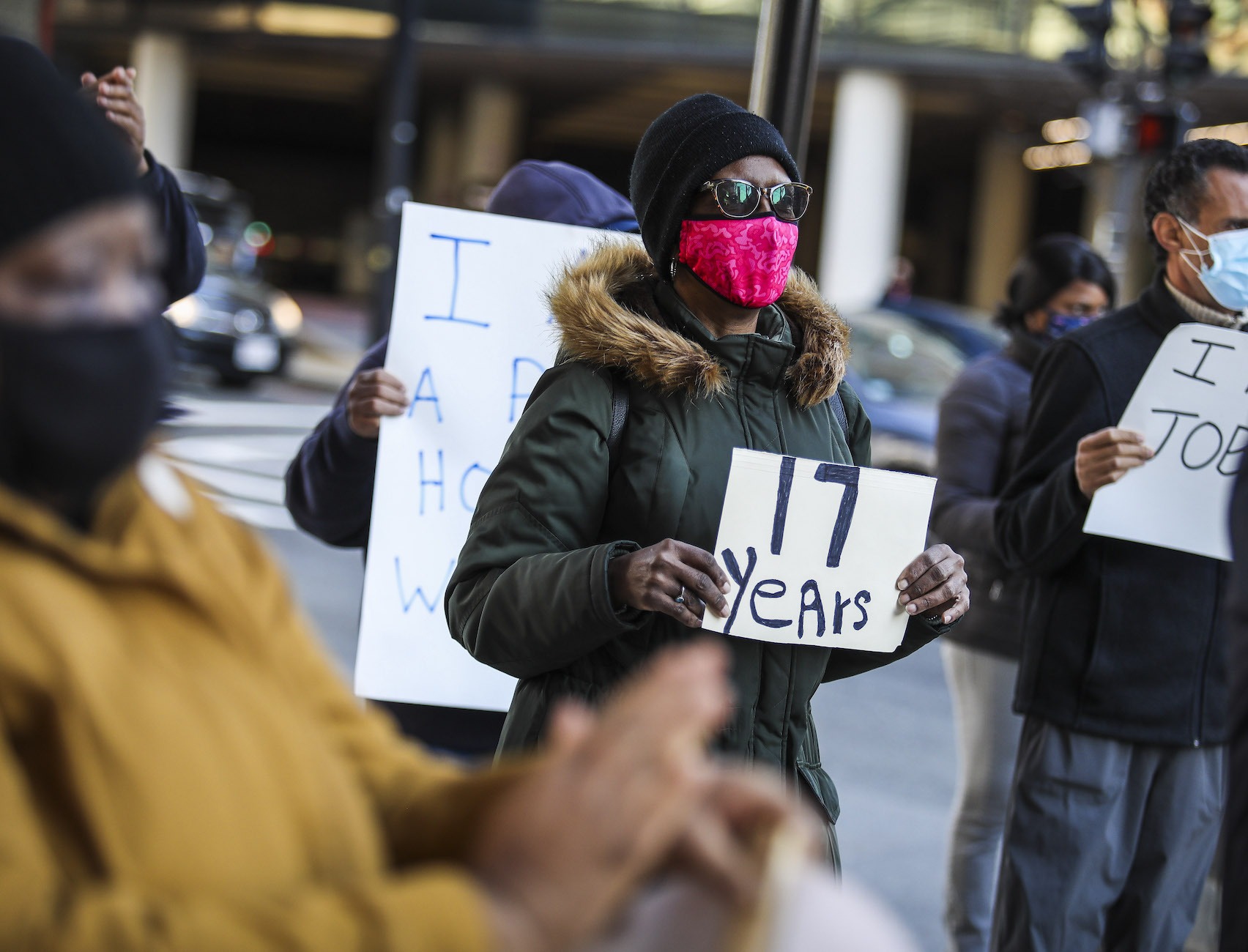Commentary
The U.S. Economy Won’t Recover Until Black Workers Do
Biden’s American Rescue Plan is a start, but more public investment is needed to address racial inequality in the labor market.

Now that President Biden has signed the American Rescue Plan into law, millions of struggling families will get some of the relief they have so desperately needed for the last year during the COVID-19 pandemic. Parents will have more money in their pockets to make ends meet for their families. Millions of children will begin to be lifted out of poverty. And state and local governments will be able to resist buckling under the pressure of stretched budgets and resources.
The American Rescue Plan means that relief is around the corner, and is a major down payment on a commitment to creating a more resilient, inclusive economy. Recovery, however, is not yet guaranteed: The U.S. will not reach full recovery until we reach full Black employment. For that, more will be required—including further rounds of major public investment to meet long-neglected priorities to address racial inequality in the labor market.
The Federal Reserve has a “dual mandate” from Congress: to aim for the lowest possible unemployment while keeping prices stable. To uphold the first part of its mandate, the Fed often looks to the official unemployment rate. The problem is that the official unemployment rate does not illustrate the full economic picture—it is mostly indicative of how white workers are doing, not of how all workers are doing. Prominent economists, including Janelle Jones, who is now chief economist at the Department of Labor, and Jared Bernstein, a current member of the White House Council of Economic Advisers, echoed this sentiment over the summer, calling on the Fed to focus on reducing the Black unemployment rate and address the employment gaps that persist between Black and white workers.
Black and Latinx workers are routinely hit the hardest by economic downturns, and the recession caused by the pandemic has been no exception. A deeper look at both current unemployment data and pre-pandemic numbers tells us that the economy has not worked for all of us for decades. Building back better means that we cannot return to this economy.
The pandemic exacerbated the already shocking levels of racial inequality in our economy. Last month, the unemployment rate for Black workers was a devastating 9.9 percent while the unemployment rate for white workers was 5.6 percent. But a year ago, before the pandemic, the Black unemployment rate was 6 percent while the white unemployment rate was 3 percent—a major and troubling gap.
The disparities are even greater when broken down by gender and age. The seasonally adjusted unemployment rate for Black women (age 20 and up) was nearly 9 percent in February, compared to just under 5 percent in February 2020. The numbers for white women were 5.2 and 2.8 percent. For Black men of the same age range, the unemployment rate was 10.2 percent, compared to 6 percent in the same time period last year. For white men the numbers were 5.3 and 2.8 percent. And for Black youth between the ages of 16 and 19, the unemployment rate was at a stunning 19.8 percent this February while the rate for white youth was 13.1.
The significant gap between Black and white unemployment—about double throughout history—is a long-standing, systemic problem. For nearly 50 years, we have tolerated recession-level unemployment levels for Black workers while lauding low unemployment rates overall, as well as labor conditions and policies that have primarily benefited white workers. The Black unemployment rate is persistently double the white unemployment rate. It is long overdue that we set the standard for a new, more inclusive normal.
The U.S. cannot risk making the same major mistake it did during the Great Recession—declaring victory on economic recovery while Black workers remained excluded from the labor market. But the hand wringing has already begun from familiar conservative and neoliberal corners of the economy policy world, including Clinton-era Treasury Secretary Larry Summers and the Center for a Responsible Federal Budget, an austerian organization the holds more mainstream political influence than it deserves. These voices fearmonger about the federal deficit, inflation, and the national debt, and wrongly say that we risk overheating the economy.
The real risk remains going too small on public investment, failing to focus on the communities most devastated by our unequal economy, and cutting off the help we need to fully recover too soon. Ending or slowing the pace of public investment before Black workers can reap the benefits—like wage growth and a low unemployment rate—means that white workers will recover while Black workers won’t. This threat far outweighs the risk of inflation. We know from the aftermath of the Great Recession—and economic downturns before it—that it takes Black households longer than white households to recover financially. Add to this that the pandemic eliminated about a decade of job gains.
If we truly want to recover, we must reach full Black employment, and that will take the type of big, bold public action that we’ve long neglected. We must work to eliminate systemic barriers in the labor market, to start to overcome the racist policy choices that have made this economy fragile and unfair to the tens of millions of Black workers whose labor goes undercompensated and undervalued. For example, the reduction of jobs in the public job sector, a significant source of middle-class employment for Black workers, has hit the Black community hardest. Because the public sector is so critical to providing job opportunity and economic security, we must invest in funding state and local budgets.
We must finally deliver on an economy that meets the needs of not only this moment, but of those past and those to come. We have the money to spend, and what we cannot afford is an economy that allows such inequality to persist.
Ashley Mitchell is director of communications at Groundwork Collaborative.
